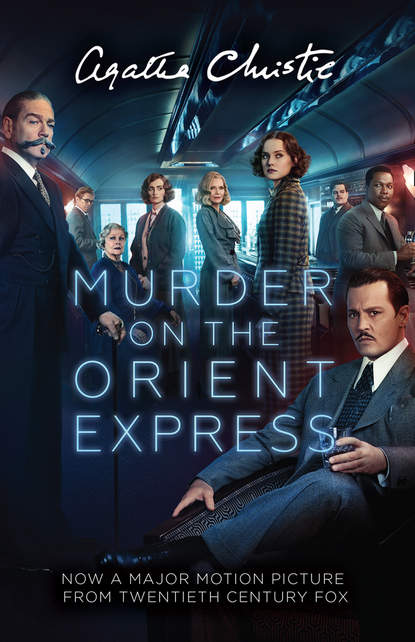По всем вопросам обращайтесь на: info@litportal.ru
(©) 2003-2025.
✖
Murder on the Orient Express
Автор
Год написания книги
2019
Настройки чтения
Размер шрифта
Высота строк
Поля
Poirot sprang up.
‘M. Bouc.’
‘M. Poirot.’
M. Bouc was a Belgian, a director of the Compagnie Internationale des Wagons Lits, and his acquaintance with the former star of the Belgian Police Force dated back many years.
‘You find yourself far from home, mon cher,’ said M. Bouc.
‘A little affair in Syria.’
‘Ah! And you return home—when?’
‘Tonight.’
‘Splendid! I, too. That is to say, I go as far as Lausanne, where I have affairs. You travel on the Simplon-Orient, I presume?’
‘Yes. I have just asked them to get me a sleeper. It was my intention to remain here some days, but I have received a telegram recalling me to England on important business.’
‘Ah!’ sighed M. Bouc. ‘Les affaires—les affaires! But you—you are at the top of the tree nowadays, mon vieux!’
‘Some little success I have had, perhaps.’ Hercule Poirot tried to look modest but failed signally.
Bouc laughed.
‘We will meet later,’ he said.
Hercule Poirot addressed himself to the task of keeping his moustaches out of the soup.
That difficult task accomplished, he glanced round him whilst waiting for the next course. There were only about half a dozen people in the restaurant, and of those half-dozen there were only two that interested Hercule Poirot.
These two sat at a table not far away. The younger was a likeable-looking man of thirty, clearly an American. It was, however, not he but his companion who had attracted the little detective’s attention.
He was a man of between sixty and seventy. From a little distance he had the bland aspect of a philanthropist. His slightly bald head, his domed forehead, the smiling mouth that displayed a very white set of false teeth, all seemed to speak of a benevolent personality. Only the eyes belied this assumption. They were small, deep set and crafty. Not only that. As the man, making some remark to his young companion, glanced across the room, his gaze stopped on Poirot for a moment, and just for that second there was a strange malevolence, and unnatural tensity in the glance.
Then he rose.
‘Pay the bill, Hector,’ he said.
His voice was slightly husky in tone. It had a queer, soft, dangerous quality.
When Poirot rejoined his friend in the lounge, the other two men were just leaving the hotel. Their luggage was being brought down. The younger was supervising the process. Presently he opened the glass door and said:
‘Quite ready now, Mr Ratchett.’
The elder man grunted an assent and passed out.
‘Eh bien,’ said Poirot. ‘What do you think of those two?’
‘They are Americans,’ said M. Bouc.
‘Assuredly they are Americans. I meant what did you think of their personalities?’
‘The young man seemed quite agreeable.’
‘And the other?’
‘To tell you the truth, my friend, I did not care for him. He produced on me an unpleasant impression. And you?’
Hercule Poirot was a moment before replying.
‘When he passed me in the restaurant,’ he said at last, ‘I had a curious impression. It was as though a wild animal—an animal savage, but savage! you understand—had passed me by.’
‘And yet he looked altogether of the most respectable.’
‘Précisément! The body—the cage—is everything of the most respectable—but through the bars, the wild animal looks out.’
‘You are fanciful, mon vieux,’ said M. Bouc.
‘It may be so. But I could not rid myself of the impression that evil had passed me by very close.’
‘That respectable American gentleman?’
‘That respectable American gentleman.’
‘Well,’ said M. Bouc cheerfully. ‘It may be so. There is much evil in the world.’
At that moment the door opened and the concierge came towards them. He looked concerned and apologetic.
‘It is extraordinary, Monsieur,’ he said to Poirot. ‘There is not one first-class sleeping berth to be had on the train.’
‘Comment?’ cried M. Bouc. ‘At this time of year? Ah, without doubt there is some party of journalists—of politicians—?’
‘I don’t know, sir,’ said the concierge, turning to him respectfully. ‘But that’s how it is.’
‘Well, well,’ M. Bouc turned to Poirot. ‘Have no fear, my friend. We will arrange something. There is always one compartment—the No. 16, which is not engaged. The conductor sees to that!’ He smiled, then glanced up at the clock. ‘Come,’ he said, ‘it is time we started.’
At the station M. Bouc was greeted with respectful empressement by the brown-uniformed Wagon Lit conductor.
‘Good-evening, Monsieur. Your compartment is the No. 1.’
He called to the porters and they wheeled their load half-way along the carriage on which the tin plates proclaimed its destination:
ISTANBUL TRIESTE CALAIS
‘You are full up tonight, I hear?’
‘It is incredible, Monsieur. All the world elects to travel tonight!’

















